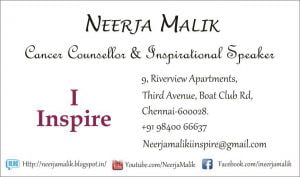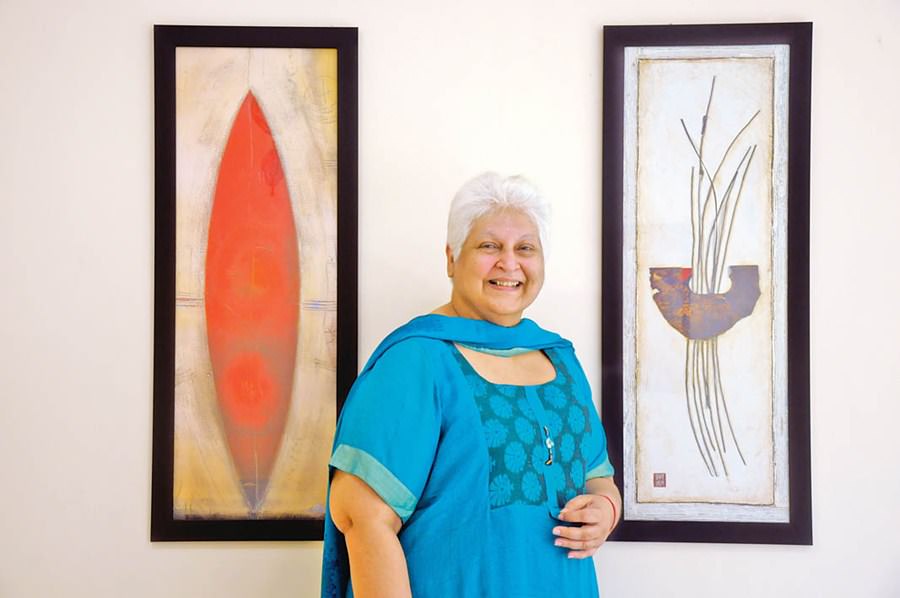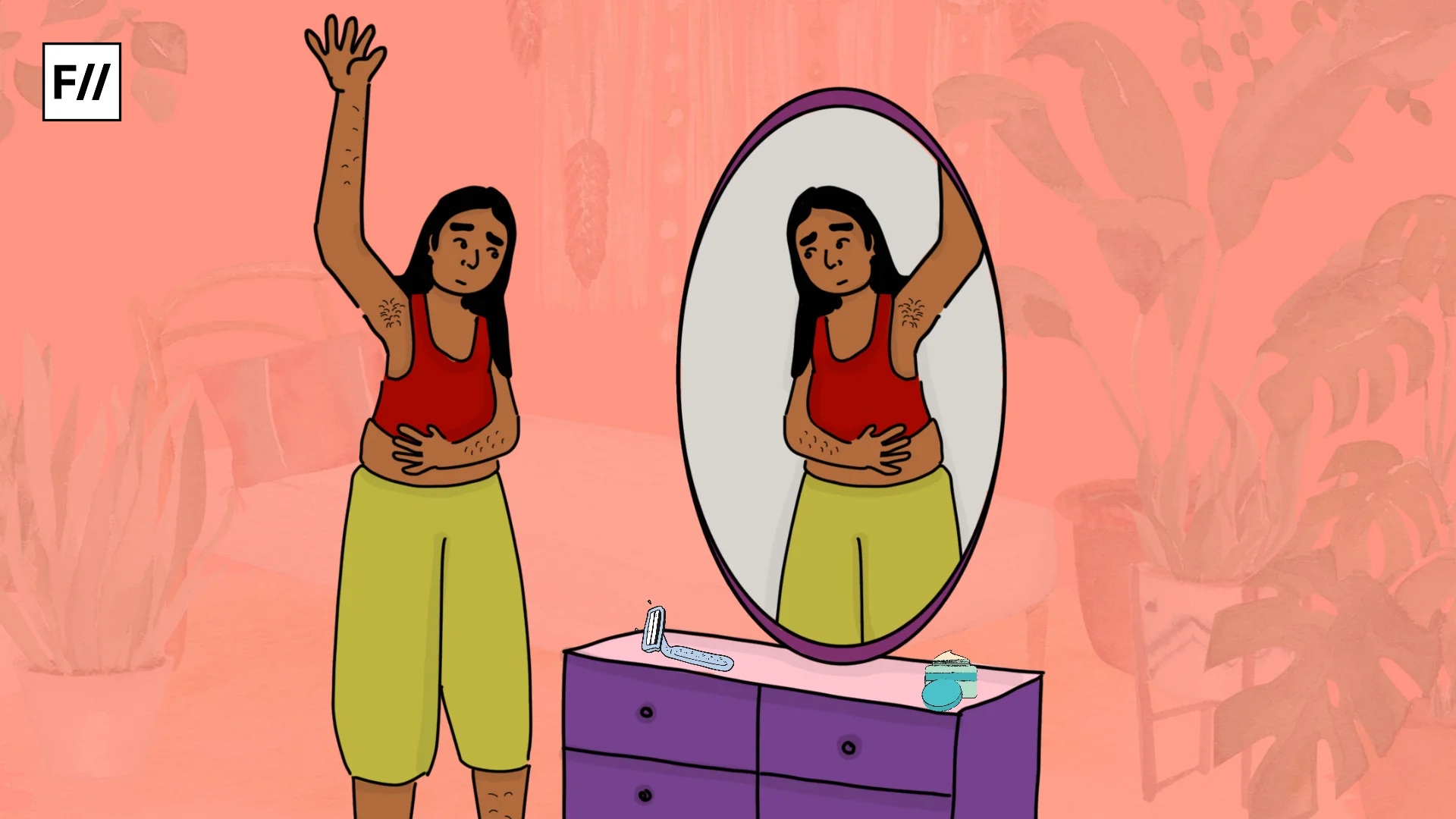Neerja Malik is not a survivor – she’s a conqueror. Life threw her obstacle after obstacle – multiple miscarriages, a stillborn child, ovarian cysts that required removing both ovaries and her uterus, two cancer diagnoses, and the deaths of many loved ones from cancer. But Neerja did not merely survive, she turned these obstacles around to create a life rich with meaning, both for herself and the countless lives she’s touched in the last 19 years via her Cancer Support Group in Chennai. I spoke to Neerja about her tumultuous life and how she found the strength not only to carry on and keep going but inspire so many similarly stricken lives around her.
In her deep warm voice, she answered that it came naturally to her. Every single one of her setbacks, she said, helped in creating the empathy she needed to be a counsellor to those who felt hopeless in their battle with cancer.
Neerja Malik attributes her overwhelmingly positive attitude to the deeply nurturing environment she grew up in. Her family is her biggest support system, and her twin children (who were 7 years old when she was diagnosed for the first time) are the reason she keeps going on.
Cancer is a hereditary trait on both sides of Neerja’s family. She estimates that there have been at least 60 cases of cancer in the last three generations of her family. She grimly remembers a trip to Los Angeles in 1981 with her two cousins, one of whose mothers had passed away with ovarian cancer. They were talking about the spate of cancer diagnoses in the family, and Neerja idly wondered, “Who next?” In a cruel twist of fate, all three of them would go on to be diagnosed with different forms of cancer.
Neerja was first diagnosed with cancer in her left breast in February 1998 in Apollo Hospitals, Chennai (on a Friday the 13th, she remembers). Just 6 short years later, she had cancer again, on her right breast this time. She tells me with a chuckle, “Thank God I only have two boobs!”
Doctors told Neerja that she would have a better chance at survival – even that being pegged only at 25% – if she went to the US or France, where there was more advanced stem cell research. Neerja refused – she did not want to be away from her 7-year-old twins, born to her after many miscarriages. Instead, she travelled between her home in Chennai to her parents’ home in Bombay, where she underwent her chemotherapy and radiation.
It was while undergoing treatment in Bombay the first time that Neerja chanced upon her lifelong vocation. She met a woman who ran a support group for cancer survivors in Bombay and was hugely inspired by that meeting. She exclaimed, “I will go back to Chennai and run a support group myself!” However, the lady strongly discouraged her from it (the “voice of doom”, as Neerja says). She said that Neerja needed to wait until she was 5 years in remission before she started a support group because having a support group leader who was battling cancer herself would be demotivating to the patients.
Disappointed, Neerja returned to Chennai in December 1998 after successfully completing treatment in Bombay. But soon after that, she got a call from her uncle whose friend had been admitted in Apollo Hospitals with a cancer diagnosis and was very depressed. Her uncle told her, “Your zest for life has remained unchanged throughout your ordeal with cancer, you seem exactly the same. Maybe you can help this chap.”
And so it turned out that she gave her first counselling just 5 short months after completing her chemo treatment, instead of the five years that had been recommended. She remembers that first session quite clearly. “When I entered the room, the man was slumped over on the bed and his wife was weeping inconsolably. I spoke to him for 20 minutes. By the time that I left, the man was sitting up straight, leaning almost regally back on his bed. He looked like a Pathan – all that was missing was a hookah! His wife had forgotten her tears, she was running around trying to arrange a cup of tea for me.”
The hospital began to notice the difference Neerja was making on the patients she visited, and began to call her in every day to talk to “this patient in room 448, or that one in room 303.” She began to campaign for an official Apollo Cancer Support Group that she could lead. But with bureaucracy being what it was, it took almost 6 years to get that Support Group off the ground. It was finally inaugurated on 8th March 2004.

In case you want to get in touch with Neerja, refer above.
In November of the same year, Neerja was diagnosed with cancer again, this time on her right breast. She remarks, with a short laugh, that if she had waited the requisite 5 years to begin the support group, she would have never gotten it off the ground.
Successful with beating cancer the second time too, Neerja came back and continued her support group, and has done so for nearly 20 years now. “God has given me this gift of the gab,” she says reflectively, “Whatever I say seems to strike them at the heart. Even if the words I say are the same, the way that they impact each patient is different. And in some way, I am able to inspire them to keep on trying.” Her main message to her support group is that “Cancer is not the be-all and end-all of existence.”
Neerja prides herself on being unconditionally available to those that need her help. There is no better story to exemplify this than the time that she counselled one of her close friends whose wife had been diagnosed with cancer – while still recovering from the anaesthesia from her own surgery. He had called her, very upset, telling her about his wife’s diagnosis. Neerja spent 45 minutes patiently telling him which hospital to go to, what treatment she’d have to go through, what the effects of that treatment would be, which doctor to visit, and even the name of the doctor’s secretary! It was only when he asked if he could visit her at her home in Chennai that she gently revealed that she was, in fact, in Bombay, recovering from her own surgery just hours prior, still foggy from anaesthesia.
Her perennial availability has won her the faith and trust of all her support group members. She says that she sometimes speaks with patients at 2 or 3 AM at night, when they do not want to wake up their family members, but need someone to talk to. Neerja has borne witness to her support group members’ deepest thoughts and most naked vulnerabilities.
I asked Neerja about both her and her patients’ relationships with their post-surgery body. With her usual candour, Neerja replies: “I used to be quite the bomb in my time. Now, with the number of steroids that have been stuffed in my body, I am more of a grenade.”
Neerja underwent two lumpectomies instead of mastectomies, where only the malignant lump was removed, as opposed to the entire breast. Because of this, she says, “Both my breasts are now different sizes and different shapes. The right one is very scarred. On the left side, I don’t even have an armpit, because they had to scoop out the nodes through my armpit. I accept it, I am happy, I am alive. But there are other people who cannot accept their bodies changing. It is my job and my passion to make them feel better. They’ve got to tell themselves, ‘My boob is gone, but I’m alive.’”
She recalls the story of a woman who, after her mastectomy, told her that her body was now a ‘shaitan’, because it was no longer perfect. Neerja gave her the analogy of an apple. “If a part of an apple is spoiled, you don’t throw it all away – you just throw out the part that is spoiled and use the rest. Your body is still useful, and it can still serve you.”
There have been women whose husbands divorced them or left them after their mastectomies. But ultimately one needs to reconcile themselves with their new bodies. Of course, the privilege of wealth affords a greater range of options if one requires them, like plastic surgery, but there are also cheaper options of silicone/foam padding for bras.
But while breasts are hidden from view, for the most part, hair is not. Women often have the hardest time with the hair loss that accompanies chemotherapy treatments, Neerja tells me. Her own hair loss story was rather filmy. “I was scheduled to have my second chemo on that day, and my hair had been intact until then. I thought about how the doctors were probably all idiots since my hair had not fallen during my first chemo cycle like they had predicted. As I stood taking a shower, soaping my neck, I began to feel tufts of hair falling away along with the water. I went to the balcony, and like one of those young lovers who cast flower petals into the wind while chanting ‘he-loves-me, he-loves-me-not, I cast my hair into the wind and watched it fly away.
“I bought a wig, but it was too hot in Chennai to wear a wig on a regular basis. So I began to tie scarves on my hair in very fashionable ways. In South India, people just assume you have gone to Tirupathi and shaved your head, so I also started nodding when people made that assumption. Eventually, when I did go to Tirupathi, I made sure to thank Lord Balaji for providing me with an easy justification for my hair loss!”
Neerja’s wicked humour and fierce commitment to her work were evident in spades in my conversation with her. I asked her what impact counselling sessions had on her. She replied that it felt like a high (with a cheeky little laugh suggesting a full awareness of its import). But on a more serious note, she continued that counselling someone from the brink of hopelessness to optimism and strength gave her an incredible amount of satisfaction and happiness. “It makes me feel alive!”
Neerja Malik has a book titled ‘I Inspire‘. You can buy it here. You can also follow her on Facebook.
About the author(s)
Asmita is a Freelance Communications Consultant, and specialises in leading digital advocacy campaigns for social and gender justice issues. When not using social media for work, she uses social media for fun (and a healthy dash of existential despair).




